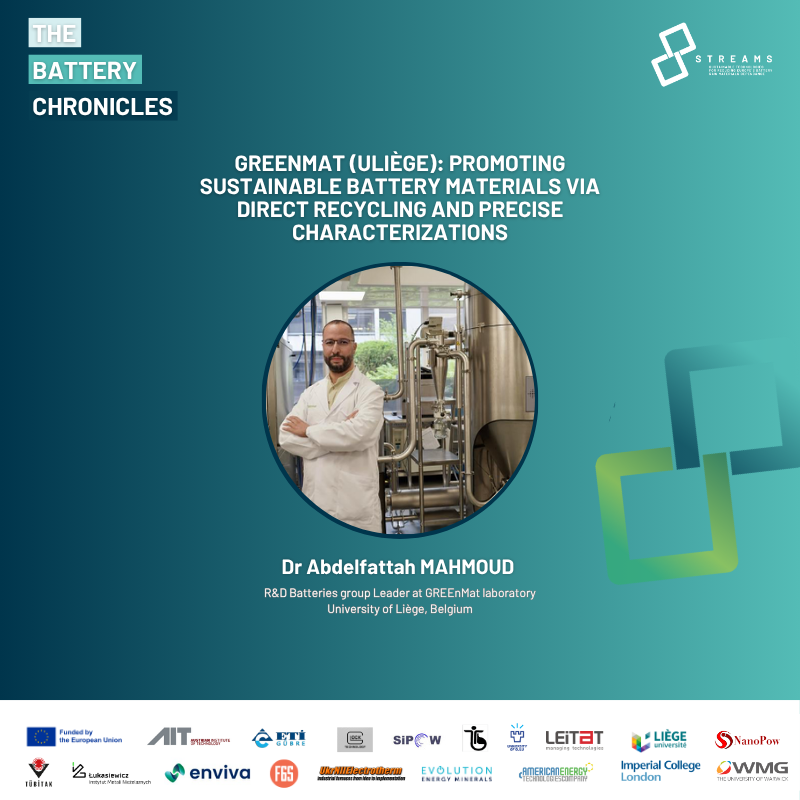GREEnMat (ULiège) is a cutting-edge research laboratory of University of Liège, notably specializing in the synthesis, functionalization and recycling of nano- and microscale materials, including oxides, alloys, metals, polymers and organic-inorganic hybrids used as electrolyte or electrode active materials in energy storage applications. Additionally, GREEnMat (ULiège) develops custom formulations -such as suspensions or slurries- for electrode fabrication through spray coating or tape casting assembling these into various cell format types from coin cells to pouch cells. GREEnMat (ULiège) has also built strong expertise in the 3D printing of all-solid-state batteries.
Our approach is centered on environmentally sustainable and green processes, with a strong focus on reducing reliance on critical raw materials. We prioritize the utilization of abundant elements such as iron, manganese, phosphorus, sulfur, and silicon to develop eco-friendly and cost-effective solutions. Another key area of activity is the development of recycling methods to recover and regenerate valuable materials from end-of-life (EoL) devices such as photovoltaic (PV) panels, tires and lithium-ion batteries.
GREEnMat (ULiège) & STREAMS
As the leader of Work Package 4 (WP4), which focuses on preparing recycled precursors for the synthesis of cathode active materials (CAMs) as well as the reconditioning of the spent CAMs. GREEnMat (ULiège) plays a pivotal role in the STREAMS Project. Beyond coordinating WP4, GREEnMat (ULiège) is also responsible for characterizing recycled precursors and regenerating spent CAMs using advanced direct recycling technologies, including spray drying technique.
Characterization of the recycled cathode precursors
The laboratory is fully equipped with state-of-the-art instrumentation to conduct comprehensive material and interface physico-chemical characterizations. Our capabilities include X-ray diffractometer, thermal analysis (TGA/DSC), carbon analyzer, laser diffraction particle sizer, dynamic light scattering (DLS), BET specific surface area measurement, Zeta potential-meter, turbidimeter, liquid and powder rheometer, UV/Vis, FTIR and Raman spectrometers, 57Fe Mossbauer spectrometer, scanning and transmission electron microscopy (SEM and TEM). Additionally, GREEnMat laboratory has a complete electrochemical characterization platform enabling in-depth investigation of the electrochemical properties of electrodes (cathode and anode) and solid electrolyte active materials.
Within the STREAMS project, GREEnMat (ULiège) has been designated to systematically characterize recycled precursors provided by WP4 partners to ensure their quality and suitability for the synthesis of recycled CAMs.
Direct recycling of end-of-life cathode active materials for Li-ion batteries
Direct recycling of CAMs from spent lithium-ion batteries is an emerging innovative technology aimed at recovering and regeneration of these materials in a few process steps with minimal chemical alteration. Unlike traditional pyrometallurgical or hydrometallurgical methods, which rely on complex chemical treatments or energy-intensive smelting, direct recycling preserves the cathode’s original crystal structure and composition. This approach is seen as a more environmentally friendly alternative since it offers significant energy savings and carbon emission reduction. By maintaining the integrity of the materials, direct recycling enables high-performance reuse without the need for complete reprocessing, supporting a circular battery lifecycle. This technology therefore significantly enhances sustainability in the battery supply chain by improving resource efficiency and reducing reliance on virgin raw materials. However, the implementation of direct recycling faces challenges, including contamination, variability in material composition, and the lack of scalable, standardized industrial processes which impede – at this stage- a widespread adoption at practical industrial level.
As part of the STREAMS project, GREEnMat (ULiège) is investigating and developing innovative direct recycling methods to regenerate the EoL CAMs encompass solid-state, hydrothermal, and spray drying techniques. These approaches are tested at both laboratory and pilot scales, with the reconditioned cathode materials thoroughly assessed for their structural, morphological properties, and electrochemical performance.
Contact us, if you are interested in the synthesis, recycling, characterization of energy storage materials at GREEnMat (ULiège).
For more information, visit: https://www.greenmat.uliege.be
You can download the full article here.

